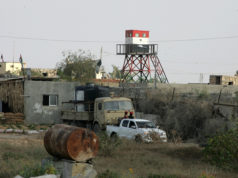Egypt’s Supreme Administrative Court on Tuesday suspended the committee appointed to draft the country’s new constitution, pending a fuller hearing and ruling on its legality in higher courts. The case, brought by lawyers and activists, challenges the process used to form the 100-member assembly. The Islamist-dominated Egyptian parliament last month voted to fill 50 seats from members of parliament, and the other 50 from outside the body. The lawsuit argues that parliamentarians cannot elect themselves according to a 1994 Egyptian Supreme Constitutional Court ruling.
The constitutional assembly, as appointed by parliament, was comprised of nearly 60 Islamists, while only six members were women and another six Christian — prompting parliament’s liberal groups, Coptic Orthodox Church, and the country’s highest Sunni Islamic institution, Al-Azhar, to withdraw their representatives.

An Egyptian protester in Cairo. His sign reads: “We did not die for the Brotherhood to write the constitution”. (Photo: REUTERS/Amr Abdallah Dalsh) |
Egypt’s constitution was suspended by the army in February 2011, shortly after it took control of the country following Mubarak’s ouster. A military council has since exercised executive powers with the help of an army-appointed cabinet. The new constitution, in theory, was to be created prior to Egypt’s presidential elections so that the president’s power is checked by specific rules that guarantee freedoms for the people. Without a new constitution, the old document, which gives the president near-dictatorial powers, will prevail when the military council is replaced. Egypt’s new president could essentially rule from Cairo as Hosni Mubarak did.
In an interesting twist of events, the court’s ruling may negatively impact the Muslim Brotherhood’s ascent to power. The group pledged not to nominate a candidate for the presidency, instead favoring a system with a strong parliament — filled with Muslim Brothers, of course — and a weak president. But with parliament potentially weakened through the court system rejecting its method of creating the constitutional assembly — thus decreasing the Brotherhood’s potential power on molding the new constitution — the Muslim Brotherhood has now chosen a presidential candidate to run under its flag, Khairat al-Shater. Al-Shater’s success, or lack thereof, will reflect back on the Brotherhood.
Much is at stake for the new Egypt. With elections scheduled to begin next month for a president whose power may not be as curbed as some would hope, the Egyptian people may want to think twice about who they vote for at the polls.





